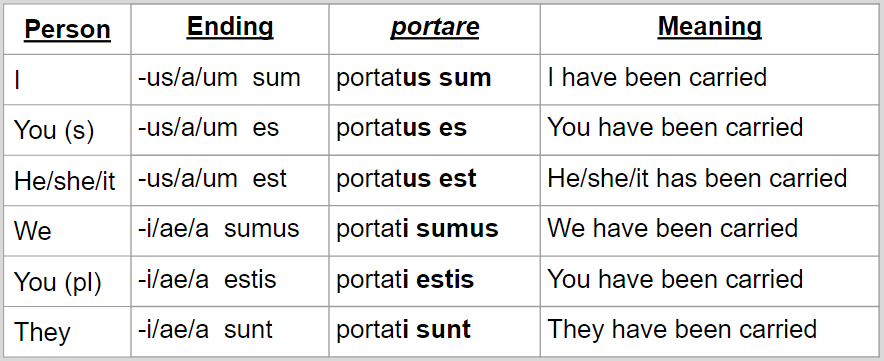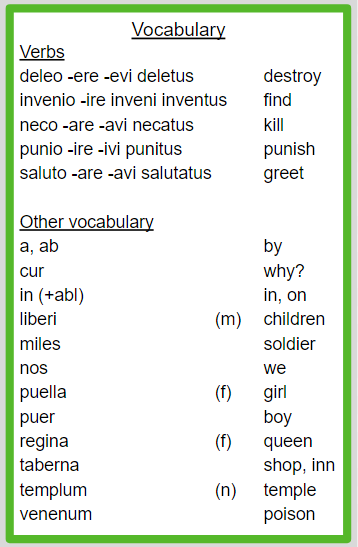Perfect Passives: PPPs + esse
January Latin Challenge: Day 29 of 31
Today’s post is about perfect passive verbs. How to form them, how to recognize them, and how to translate them. If you're struggling with any of these verb endings, go and download my Complete Reference Guide to Latin Verbs. It has all the verb tables you're going to need, and it'll really help you out as you go through this post.
Active or Passive?
Well, an active verb is when the nominative is doing the verb:
The boy kicked the horse.
A nice, simple sentence.
A passive verb is when the nominative is having the verb done to it:
The boy has been kicked by the horse.
The nominative is still the boy, but his role has changed. He has been kicked by the horse. He is passively accepting the action.
The importance of PPPs
Perfect passives in Latin are formed using the perfect passive participle, which is the fourth principle part in your dictionaries. If you have forgotten, or want a reminder of what the principal parts in Latin are, read Day 20 of the January Latin Challenge: The Importance of Principal Parts.
Added onto that, as a separate word, is the present tense of the verb esse, which is “to be”, that changes person ending depending on the grammatical nominative.
The perfect passive participle ending is always nominative in perfect passive verbs, and it changes gender and number to match the nominative. Let me show you what I mean:
For singular nominatives (the top 3 rows)
The endings for the perfect passive verbs are the perfect passive participle with the endings -us, -a, or, -um, depending on the gender of the nominative.
Then you add esse in the present tense. For the “I” version of the verb, sum. For the “you” version of the verb, add es, and so on and so forth.
When you get to the plural person endings:
the number of the perfect passive participle has to change. It still depends on the gender, -i, -ae, -a, but now they are all nominative plural.
Then add on sumus for we, estis for you plural, or sunt for they.
How to translate
Be very careful to translate this as HAVE, not had. HAD is only for pluperfects. If you want those posts, the Pluperfect Active is here, and the Pluperfect Passive is coming up tomorrow for Day 30, so subscribe below to get it straight to your inbox.
You can also, for more fluent translations, say “I was carried”, or “I was kicked” rather than “I have been carried”. That's fine as well, but just have it in your head that it's not imperfect. It's a perfect passive.
Example Sentences
All the vocabulary is in the green box below. For the verbs, I've given you all four principle parts. That means I've given you the usual I form of the present tense. deleo: I destroy, invenio: I find, etc. Then the infinitive. The third option is the perfect stem, and the fourth option, the last option in all verbs is the perfect passive participle. That's the bit you're looking for when you're doing perfect passive verbs.
So the key thing with these is if you see the verb “to be” in the present tense, you always want to look just in front of it to see if there is a perfect passive participle. This is why it's really important to learn all your principle parts in your dictionary list so that you know how the verbs change.
Have a go, and read on when you’re ready for explanations.
nos in taberna inventi sumus.
puellae a puero salutatae sunt.
regina veneno necata est.
cur puniti estis, liberi?
templum a militibus deletum est.
Read on when ready!
nos in taberna inventi sumus.
Look for a verb first of all, as always. sumus is right at the end. I know that means “we are”. However, I'm also going to have a little look just in front of it to see if there is a perfect passive participle.I've got the word inventi. In the vocab box, I can see that inventus is a singular masculine version of the perfect passive participle. inventi, therefore is one of the plural masculine endings. So I have inventi sumus, “we have been found”.
nos goes with this, so it just gives me more information that it is “we”
“We have been found in the shop.”
puellae a puero salutatae sunt.
Checking the verb first: sunt, the present tense of the verb “to be”. Then check just in front of it and see that we have salutatae, which from the vocabulary is a perfect passive participle of the verb “to greet”.
So salutatae sunt is a “they” form of a perfect passive verb. It's a feminine plural, because it is salutatae, with -ae at the end, the feminine ending. It's got to be nominative because the verb always has to match the nominative. It means “they have been greeted”.
I'm going to be looking for a plural feminine noun if I can find one. puellae which is feminine, plural, and nominative.
“The girls have been greeted by the boy.”
regina veneno necata est.
necata est: I know this has to be “he, she, it has been something-ed” because even though the PPP has an -a ending, which could be feminine singular, or neuter plural, I then have est. This is actually easier than some other matching up activities you have to do in Latin. Because I have that est I know it is singular, so it can only match my third person singular, and I know it has to be a feminine because it's nominative, necata est.
Now I'm going to look for a feminine noun. regina necata est makes sense. So regina, the Queen, has been killed.
Then I've got veneno, an instrumental ablative, “by poison”.
“The Queen has been killed by poison.”
cur puniti estis, liberi?
This is a question, so we may need to switch the translation around to make it make sense as a question in English.
cur means “why”.
puniti estis: estis shows it's you plural. puniti is a perfect passive participle which comes from punio. Then I need to switch it round. Usually it would be “you have been punished”. But because this is a question I'm going to say, “why have you been punished?”
Finish the sentence with liberi, children.
“Why have you been punished children?”
templum a militibus deletum est.
est I know is a third person singular. deletum tells me that it is neuter, so I'm going to be looking for a neuter nominative.
In this case, templum matches. So templum deletum est, “the temple has been destroyed”.
a militibus, an ablative of agent: “by the soldiers”.
“The temple has been destroyed by the soldiers.”
So that's the idea of perfect passive verbs. You take the perfect passive participle in the nominative form. It has to match the nominative that it's describing in case, number, and gender. And then you add on the verb “to be” in the present tense: sum, es, est, sumus, estis, or sunt, depending on who is doing the verb.
If you have any questions or queries, if you're struggling with anything, let me know in the comments. Thank you so much for joining me today, and I'll see you tomorrow on bambasbat for the penultimate day of the January Latin Challenge!



